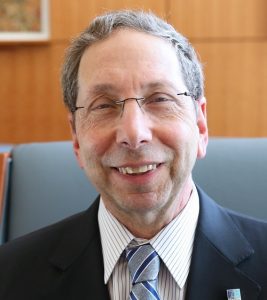
COVID-19, a communicable disease caused by the Severe Acute Respiratory Syndrome Coronavirus-2 (SARS-CoV-2), is a relatively new pandemic in the public’s eye, but it is only one of the many infectious diseases that epidemiologists like David J. Weber, MD, MPH, are continually facing.
“I was at UNC for the onset of the HIV pandemic, 2001 anthrax biothreat, 2003 smallpox vaccine campaign, 2003 SARS-CoV-1 pandemic, 2009 H1-N1 Flu Pandemic, and the 2014 to 2016 outbreak of Ebola,” said Weber, who is Professor of Medicine and Pediatrics in the Divisions of Infectious Diseases in the Departments of Medicine and Pediatrics, and a Professor of Epidemiology in the Gillings School of Global Public Health. “It was never a question of if we’d have another pandemic, it was only a question of when we would see the next one. However, I don’t think we envisioned quite a pandemic of this duration and severity.”
Weber is one of many researchers and physicians at the University of North Carolina – Chapel Hill who have jumped into action to learn more about the virus and how to treat patients and mitigate its spread. Research has exploded ever since the pandemic first hit the United States, and it shows no signs of stopping as new variants pop up and society continues to grapple with its impacts.
Weber has also just reached a formidable hallmark: his fiftieth publication about coronaviruses and COVID-19. His series of papers cover a variety of topics, from environmental contamination in hospitals and masking in schools to vaccine requirements and mental health. His research has played an important role in creating new policies and ways that we can keep ourselves and patients safe in community and hospital settings.
COVID-19 Vaccination as a Condition of Employment
Weber was the lead author on a multi-society statement on COVID-19 vaccination as a condition of employment for healthcare personnel, which was published in Infection Control & Hospital Epidemiology in January 2022.
The statement, which recommends that COVID-19 vaccination be a condition of employment for all healthcare personnel in the United States, was supported by members of the Society for Healthcare Epidemiology of America (SHEA), the Society for Post-Acute and Long-Term Care Medicine (AMDA), the Association for Professionals in Epidemiology and Infection Control (APIC), and other associations and societies. So far, the statement has been accessed 5,000 times.
Looking Back and Looking Forward on the Pandemic
Another paper that Weber was involved in, this time as co-author, discussed the lessons that hospital epidemiologists have learned from the pandemic and what the challenges are going into the future. Around the time of publication, COVID-19 was waning in the United States, which allowed them time to take note of how doctors have responded, what went well and what didn’t, and how to establish a “new normal” for the country.
Environmental Spread and Masking Studies
Dr. Weber has also assisted a series of studies on the effectiveness of masks to protect against inhalation of SARS-CoV-2.
ABC Science Collaborative
Weber has also been working with Duke University on their ABC Science Collaborative program. The program pairs scientists and physicians with school and community leaders to help understand the most current and relevant information about COVID-19 transmission in K-12 schools.
The program helps school leaders make informed decisions about returning to school, masking, and physical distancing using data from their own communities. This ABC collaborative has led to more than 5 publications on the topics.
COVID-19 in Thailand
Weber has also been doing important work outside of the United States. He has co-authored a series of papers looking at the impact of COVID prevention and mitigation in Thailand; research led by Dr. Anucha Apisarnthanarak, a Professor and Chief of the Infectious Diseases Division at Thammasat University Hospital, Thailand.
But, Weber says that his contribution to COVID-19 research at UNC only represents a small part of the overall research efforts. Other physicians across the Division of Infectious Diseases, the School of Public Health, and the School of Pharmacy have stepped up clinically to help manage the patients and have done a tremendous amount of research on COVID.
“It is wonderful to have colleagues that I can work with on this as well,” said Weber. “It is very exciting and gratifying to be at a place with such superb colleagues with such a broad interest in infectious disease.”
However, research cannot be implemented without the help of dedicated front-line workers who put ideas and techniques into practice. Patients with COVID-19 infections, reinfections, or long-term COVID have received great care from clinicians, physicians, nurses, respiratory therapists, and advanced practice providers across North Carolina.
You can view all of his publications in PubMed.